Honors College Research Faculty
Meet Our Research Faculty
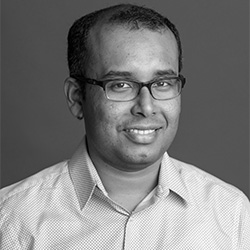
Chinmoy Bhattacharjee, Ph.D.
Assistant Professor, Physics
Chinmoy Bhattacharjee received his bachelor’s degree in physics from Columbia University. He obtained his Ph.D. from the University of Texas at Austin. His current research interest pertains to the relativistic plasma dynamics near compact objects, such as neutron stars, black holes, etc.
“Plasmas, often referred to as the fourth state of matter, are ubiquitous across the universe, spanning from the vast scales of extra-galactic jets to the finer scales of the solar wind. My primary research interest lies in astrophysical and laboratory plasmas, focusing particularly on the dynamics of relativistic plasmas near compact objects and laser-matter interactions. In astrophysics, I apply General Relativity (GR) to plasma physics to explore critical questions, such as the generation of seed magnetic fields and plasma flow vortices, the relaxation and self-organization of magnetic and flow profiles in plasmas, and the propagation of electromagnetic waves near black holes and neutron stars. In the laboratory setting, I investigate various plasma processes in laser-produced plasmas, including the self-transparency effect, the self-generation of magnetic fields, and their effects on plasma confinement.”
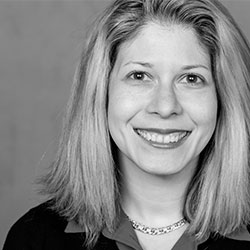
Amanda Golden, Ph.D.
Associate Professor, English
Amanda Golden is a scholar of twentieth-century literature and culture. In particular, she specializes in archival research, working with writers’ manuscripts and related materials to better understand creative practices. She has published widely on poetry and fiction, modern literature, and digital pedagogy. Her scholarship informs the courses she teaches, including the ICLT courses Women, Technology, and Art and Global Literature and Digital Media, which address the role of technology in literature and culture. She is the author of Annotating Modernism: Marginalia and Pedagogy from Virginia Woolf to the Confessional Poets (2020), co-editor of The Bloomsbury Handbook to Sylvia Plath (2022), with Anita Helle and Maeve O’Brien, and editor of This Business of Words: Reassessing Anne Sexton (2016). She is currently co-editing a new, scholarly, annotated edition of Sylvia Plath’s collected poems, The Poems of Sylvia Plath, with Karen V. Kukil.
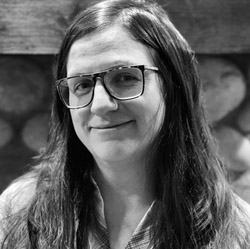
Melissa Di Martino, Ph.D.
Associate Professor, Psychology and Counseling
Melissa Di Martino investigates ways for students to have optimal experiences in the classroom, focusing specifically on psychological well-being. Rather than being in the classroom to learn and gain insight from others, the primary focus of students has shifted from education as an experience to education as an outcome, with an emphasis on grades. However, the classroom environment should be a space to exchange ideas, create stimulating dialogue, and process new information. To this end, Dr. Di Martino has investigated the effects of smartphones in the classroom on mindfulness and anxiety and the impact of meta-cognition prompts on overall course comprehension. She has expanded her research on psychological well-being in the classroom to examine the effects of exercise prior to school on the well-being of students at the end of the school day in a middle school.
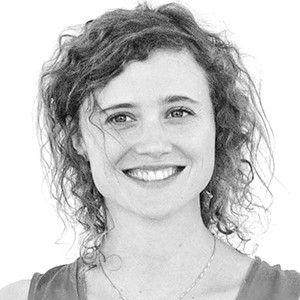
Jeannette Sordi, Ph.D.
Visiting Associate Professor, Architecture
Jeannette Sordi is a visiting associate professor in the School of Architecture and Design. She holds a Ph.D. in urban planning and design from the University of Genoa (2014) and was a Ph.D. Visiting Student at the Harvard Graduate School of Design, Chair of Landscape Architecture. Before joining New York Tech in 2019, Sordi was an associate professor of landscape and urbanism at Adolfo Ibañez University in Santiago de Chile and taught at the University of Genoa and Trento in Italy and at Syracuse University in New York City. She is also an external consultant for the Inter-American Development Bank and other international institutions.
Working at the intersection of landscape architecture, architecture, and planning in Europe and across the Americas, she has developed new perspectives and approaches in the fields of landscape urbanism, extraction territories, shrinking urban economies and adaptive reuse, and climate resilience and adaptation in vulnerable contexts. Since 2015 she has collaborated with several institutions including the Inter-American Development Bank in Argentina, Chile, and Uruguay; the Municipality of Cartagena and Chilean Division of Regional Development (Subdere, Chile); the Museum of Contemporary Art of Santiago and the Chilean Architects Council; Díacritica and Caetano Herrera University (Peru); the Municipality of Lecce, Municipality of Genoa (Italy), among others. Sordi is the author of numerous books and scholarly publications, including the books Ecological Design. Strategies for the Vulnerable City (IaDB, 2021, 2022) and two forthcoming books on Wood Ecologies and Urban Expansion in Latin America and the Caribbean.
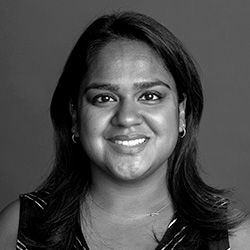
Jessica Varghese, Ph.D., RN
Associate Professor, Nursing
Jessica Varghese is an associate professor of nursing at New York Institute of Technology. She completed her Ph.D. in Nursing at the State University of New York at Buffalo. She has worked in nursing professional development and leadership roles for over 20 years.
She is the current Chair of the American Nurses Association of New York Legislative Committee and an inaugural member of the American Academy of Ambulatory Care Nurses Research Committee. She is a fellow of the Alliance of Nurses for Healthy Environments and has recently been selected to participate in the NIH-funded Environmental Health Research Institute for Nurse and Clinician Scientists.
Her focus is primarily on vulnerable populations with particular interests in environmental justice, health policy, global health, trauma-informed care, health systems, social justice, and equity research. Most recently, she had the opportunity to take students to participate in a global health medical outreach program working with refugee families in Athens, Greece. This included visiting refugee camps, refugee maternity centers, and making home visits. She has also presented her research at various regional and national conferences.
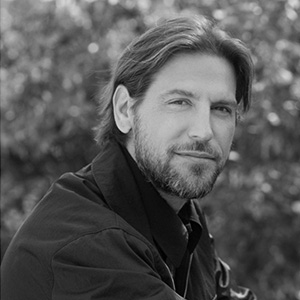
Andrew Seskunas
Adjunct Assistant Professor, School of Architecture & Design
Drew Seskunas is a practicing architect, designer, and educator who has led project-based workshops internationally on sustainable topics as diverse as solar-powered robotics at the Vilnius Academy of the Arts in Lithuania to Interactive Architecture at the Politecnico di Milano in Italy. At New York Tech, he has created a partnership with the non-profit New York Restoration Project to pair students with local community gardens in need of new infrastructure. So far, Drew and his students have created 6 permanent structures for community gardens across New York City. Over the past decade, Drew’s professional work has been recognized across disciplines by outlets such as Architectural Record as a “Next Progressive” and receiving “Best in Show” at the premier product design showcase NY NOW, and being commissioned by the NYC Parks Department to design a public sculpture currently on view in Flushing Meadows Park. He often hosts students at his design studio and building workshop in Brooklyn to inspire real-world connections with the academic problems students are posed with through metal and woodworking mentoring.
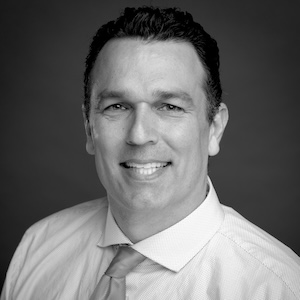
Amerigo Rossi, Ed.D., FACSM
Associate Professor, Interdisciplinary Health Sciences
Amerigo Rossi, Ed.D., FACSM, serves as the director of the Exercise and Sport Science, M.S. program and an associate professor at New York Institute of Technology’s School of Health Professions.
Applying the philosophy of “Exercise is Medicine,” his research interests include using physical activity and nutrition interventions to improve the lives of children, athletes, and people with chronic disease.
He earned his B.A. in Biological Sciences from Columbia University in 1999, his M.A. in Exercise Science from California State University Los Angeles in 2005, and his Ed.D. in Applied Exercise Physiology from Teachers College of Columbia University in 2015. His research focuses on developing sustainable physical activity interventions for vulnerable populations with the aim of reducing chronic disease. He has conducted numerous research studies to evaluate exercise programs for cancer survivors, people with paraplegia, adolescents with pre-diabetes, and people with Parkinson’s disease, among other groups.
Additionally, Dr. Rossi is an active member of the American College of Sports Medicine, where he has helped to develop the online Exercise is Medicine credential and served as an evidence analyst for position statements and 2022 President of the Greater New York regional chapter.
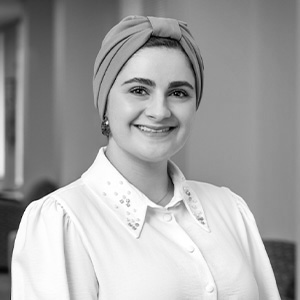
Noura El Habbal, Ph.D., R.D.
Teaching Assistant Professor, Interdisciplinary Health Sciences
Noura El Habbal, Ph.D., R.D., is a registered dietitian and researcher specializing in maternal and infant nutrition, with a focus on breast milk composition, the human milk microbiome, and early-life influences on infant health. She received her Ph.D. in Molecular and Biochemical Nutrition from the University of Michigan School of Public Health in 2022. Her dissertation, Early Life Exposures and Milk Composition Affect Offspring Health, examined fetal and lactational programming through studies of placental and mammary gland development in mouse models. She also analyzed clinical data to evaluate how variations in human breast milk macronutrient and fatty acid composition influence infant growth.
Following her Ph.D., she completed a two-year postdoctoral research fellowship in the Gregory Lab at the Connell School of Nursing at Boston College. Her work there expanded to include the study of the human milk microbiome and its origins, integrating both animal models and clinical data. As a registered dietitian, she also investigated maternal prenatal dietary intake and its associations with infant growth in term and preterm cohorts, along with inflammatory markers in preterm infants.
As a teaching assistant professor at New York Tech School of Health Professions, Dr. El Habbal continues to build on her doctoral and postdoctoral research. Her current work centers on the human milk microbiome, preterm infant gut health, and the relationships between milk composition, maternal diet, and infant adiposity.